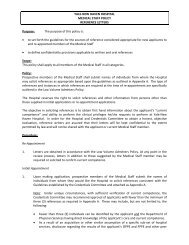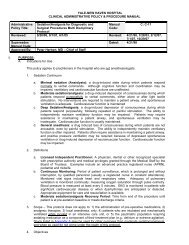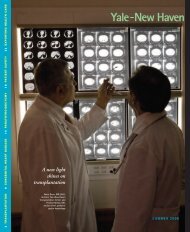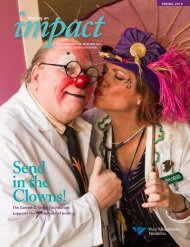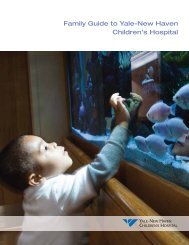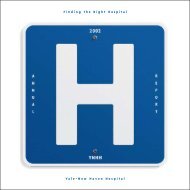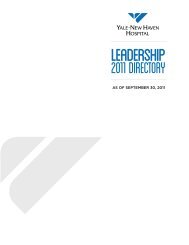Observers - Yale-New Haven Hospital
Observers - Yale-New Haven Hospital
Observers - Yale-New Haven Hospital
Create successful ePaper yourself
Turn your PDF publications into a flip-book with our unique Google optimized e-Paper software.
status. This process includes consultation with a review committee, which is appointed by the Chief of Staff.<br />
Questions concerning this procedure should be directed to the Chief of Staff's office or Legal Affairs.<br />
7. Using the above criteria as guidelines, appropriate clinical judgment should be used when determining which<br />
protective barriers (i.e. personal protective equipment) are needed. Each area must establish its own<br />
standards for consistent use of OSHA-required protective barriers; these unit standards should be based on<br />
the health care worker's skills and the reasonable possibility of contact with the patient's blood or body fluids,<br />
non-intact skin, and mucous membranes.<br />
BLOODBORNE PATHOGENS AND THE HEALTH CARE WORKER:<br />
HIV(+) HCWs should be under the care of a personal physician for appropriate immunization, prophylaxis, and<br />
treatment as indicated. Health care providers who are sero-positive for a bloodborne pathogen (e.g. HIV, Hepatitis<br />
BsAg+) should report, in confidence, to a special standing committee chaired by the Chief of Staff of YNHH to<br />
receive assistance in determining their fitness to continue to safely provide patient care. The continuing safety of<br />
the immuno-compromised health care worker, who may be exposed to infectious disease(s), is among the factors<br />
that should be discussed. All medical information will be reviewed with the individual's responsible personal<br />
physician, and all proceedings and information will be handled in a strictly confidential manner. PPD testing of<br />
HIV(+) HCWs is the same as for other HCWs (see section on TB below).<br />
Any potentially significant patient exposure to the blood of any HCW should be reported, in confidence, to<br />
Occupational Health Services, Department of Quality Improvement Support Services (<strong>Hospital</strong> Epidemiology), or<br />
the Chief of Staff for specific advice.<br />
PRE-APPOINTMENT EVALUATION AND IMMUNIZATION STATUS:<br />
Staff with direct patient contact should know their initial immunization or immune status with regard to:<br />
A. Measles, Rubella<br />
B. Hepatitis B<br />
C. Tuberculosis (PPD [Mantoux] skin test)<br />
D. Varicella (Chickenpox) [either by history, antibody titer, or vaccination]<br />
Documentation of the above will be part of the MEDICAL STAFF OFFICE FILE. Employees of <strong>Yale</strong>-<strong>New</strong> <strong>Haven</strong> <strong>Hospital</strong><br />
will have immunization status, past medical history, and PPD testing as part of their Occupational Health charts.<br />
Varicella-zoster: HCWs without a known history of chickenpox/shingles, without a known positive serology for<br />
varicella-zoster antibody, or HCWs previously vaccinated for varicella should exclude themselves from direct care<br />
of patients with chickenpox or zoster infections until the patient's lesions have crusted over. Varivax R , a live<br />
attenuated vaccine for varicella zoster, is recommended for varicella-negative health care providers and is<br />
available free of charge at the YNHH Occupational Health Service.<br />
If a non-immune or vaccinated healthcare worker has a significant exposure to varicella or zoster, he/she should<br />
contact Occupational Health Services or <strong>Hospital</strong> Epidemiology at once and follow the standard protocol(s) as<br />
instructed.<br />
Influenza: All healthcare workers are strongly encouraged to receive annual immunization against influenza.<br />
Non-immunized healthcare workers with significant exposure to influenza should contact Occupational Health<br />
Services, their primary physician, or an ID specialist regarding recommendations for anti-viral prophylaxis.<br />
Any healthcare worker who develops influenza should take a medical leave of absence from direct patient care<br />
until symptoms have completely resolved.<br />
Measles/Rubella: All healthcare workers must prove immunity to measles and rubella or receive appropriate<br />
immunization. If a HCW who is non-immune or has an unknown immunization status is exposed to a patient with<br />
8


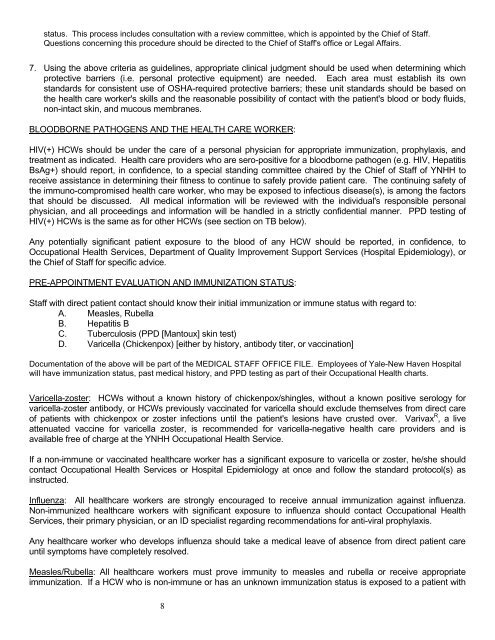
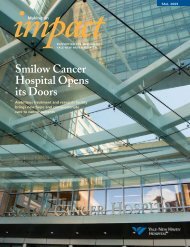

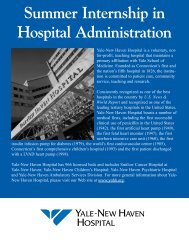
![Annual Report Donor Listings [pdf] - Yale-New Haven Hospital](https://img.yumpu.com/49673575/1/190x245/annual-report-donor-listings-pdf-yale-new-haven-hospital.jpg?quality=85)

